One-time presidential favorites engage longshot rivals
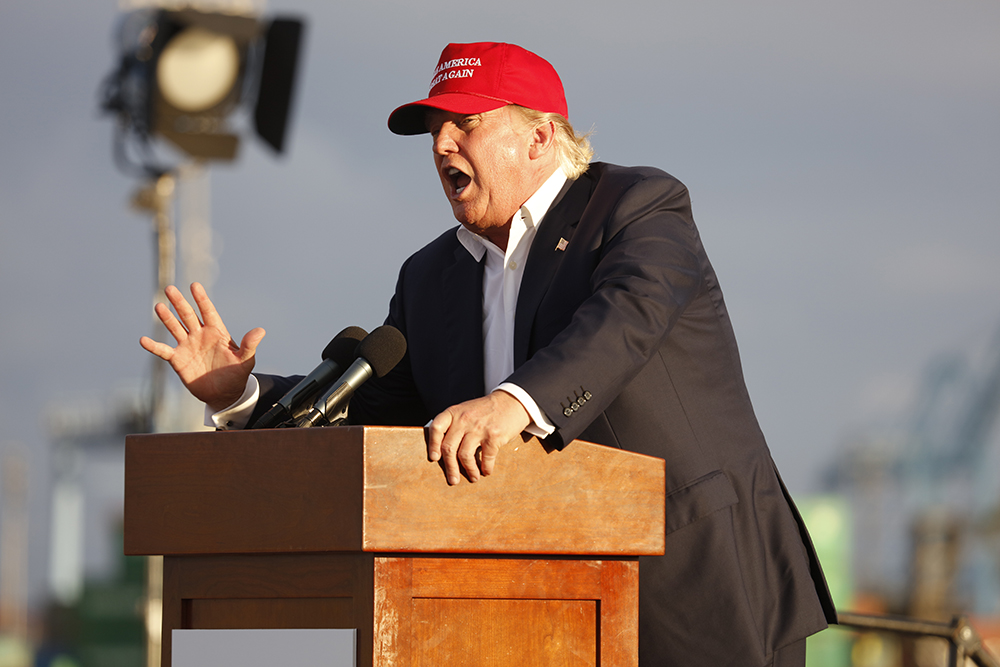
Parallel political clashes were igniting Sunday in the volatile presidential primary races, as one-time Republican and Democratic favorites battled once-unlikely rivals in their own party over guns and foreign policy ahead of the Feb. 1 Iowa caucuses. Fueling the back-and-forth: President Barack Obama‘s address heralding two developments in U.S. relations with Iran as triumphs for “smart” diplomacy. Across the Sunday talk shows hours before their next debate, Hillary Clinton battered Bernie Sanders over his new opposition to a law that shields gun manufacturers from lawsuits. On the Republican side, Donald Trump pounded rival Ted Cruz for not reporting bank loans that Cruz had called an oversight. The Texas senator stuck to his debate sneer that Trump represents “New York values.” And from the margins, far from the front-runner position that was once presumed his, Jeb Bush condemned some of his rivals — especially Trump. “The guy’s entertaining, for sure. But his ideas aren’t gonna help people,” the former two-time Florida governor said on NBC’s “Meet the Press.” ”He’s not going not win the nomination. And I am.” That’s far from clear just two weeks before the Feb. 1 Iowa caucuses, given the unsettled Republican field and Bush’s fade. But ambiguity rules the Democratic contest too: Sanders, the Vermont senator and self-described democratic socialist, was giving former secretary of state and first lady Hillary Clinton a strong challenge in Iowa and New Hampshire. On the eve of the debate, Sanders may have handed Clinton the tool she’s seeking. Sanders on Saturday night abruptly announced he now supports legislation that would expose gun manufacturers to some legal liability. Clinton jumped on the “flip-flop” and said on several Sunday shows that she hopes he changes his mind about other proposals tightening gun policy. Sanders denied he was changing position. In the past, he has said his support for the 2005 was in part an effort to protect small shops in home-state Vermont. The new proposal includes an amendment that would require the government to monitor and report on the law’s effect on small stores that serve the hunting community in rural areas. Among Republicans, as Cruz surged in Iowa, Trump grumbled that the Texas senator is “nasty” and said he would bring up Cruz’s loans that had been unreported. Cruz has said that was an oversight. Even President Barack Obama made an appearance during the Sunday morning shows to highlight back-to-back developments on Iran that he held up as victories: the release of Americans long-held by the Islamic Republic as part of a prisoner swap and the end of some sanctions against Iran as part of nuclear talks. “This is a good day,” Obama said. Republicans said they were glad the hostages were being released, but they cast the tangle of deals and developments as ultimately risky. “A very dangerous precedent,” is how Cruz, who is surging in Iowa, described the agreement’s implementation on Fox News’ “Fox and Friends.” ”The result of this, every bad actor on earth has been told, ‘Go capture an American’ … President Obama is in the let’s-make-a-deal business.” Clinton, formerly Obama’s secretary of state, backed the developments but said the U.S. needs to monitor Iran’s behavior on other matters. “If you’re committed to making the world safer and to show strong American leadership, you have to engage in patient, persistent diplomacy with people who are not your friends,” she said on CBS’ “Face the Nation.” Republished with permission of The Associated Press.
SEC Primary beckons presidential hopeful Bernie Sanders to Alabama
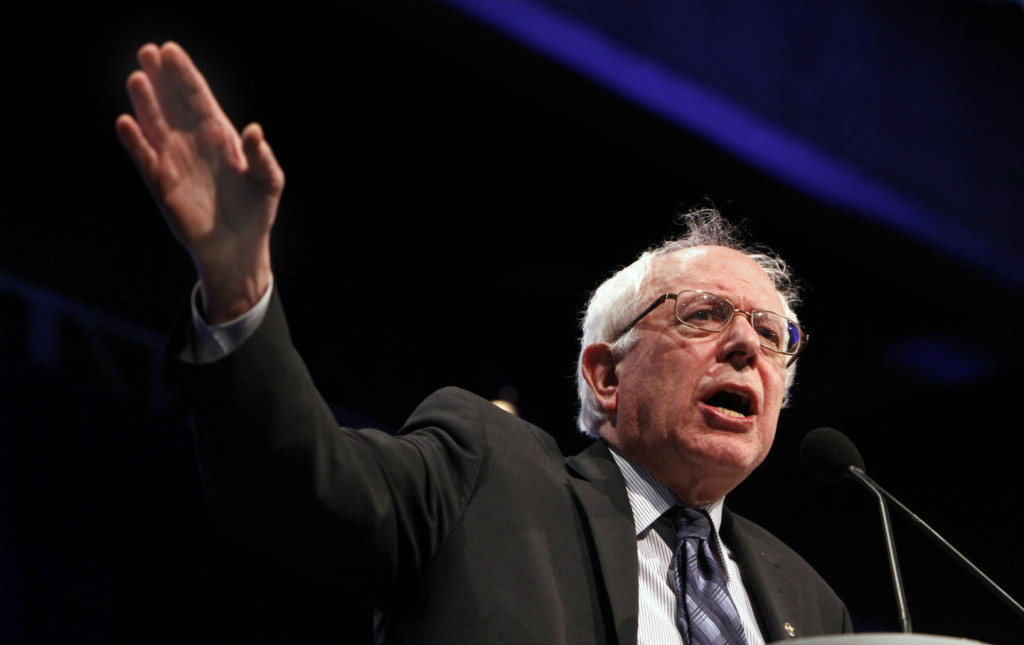
Democratic presidential candidate U.S. Sen. Bernie Sanders is making his first campaign stop in Alabama on Monday for a rally to commemorate the birthday of civil rights activist Dr. Martin Luther King Jr. The rally is open to the public and will begin at 7 p.m. in Birmingham’s Historic Boutwell Memorial Auditorium. Sanders will take the opportunity to discuss how he is “fighting for Dr. King’s ideals,” a man he marched with during the historic “March on Washington” in 1963. Joining Sanders will be “two champions for economic and racial justice,” Dr. Cornel West and Ohio State Sen. Nina Turner. “We are excited to have Senator Sanders make a campaign stop in Alabama, and we want to welcome him to our great state,” Alabama Secretary of State John Merrill said in a news release. “I am thrilled with how the SEC Primary has developed and what it means for our people to have personal interaction with these candidates.” With Alabama’s primaries moved to March 1 to be part of the SEC Primary, more presidential candidates have been making stops in the Yellowhammer State to woo voters. More will likely visit as the field narrows after the Iowa and New Hampshire caucuses, the first in the nation. “Since the March primary legislation passed, the Democratic front runner and eight of the top Republican candidates have made campaign stops in Alabama, which is unheard of for our state,” Merrill wrote. “As Secretary of State, I will continue to position Alabama and the South as a place where Presidential candidates are willing to make an effort to visit and meet our remarkable people.” Rumors suggest that the Sanders campaign is also planning a stop in Montgomery at Alabama State University as part of the candidate’s tour of Historically Black Colleges and Universities (HBCU), though no date has been set for that event. “If this shows anything, it shows that Alabama is a state that everyone wants to do well in,” Merrill said. “Mr. Sanders wasn’t expected to make a stop here, so we are very excited to have him.”
Presidential Primary Brief: 301 days until Election Day
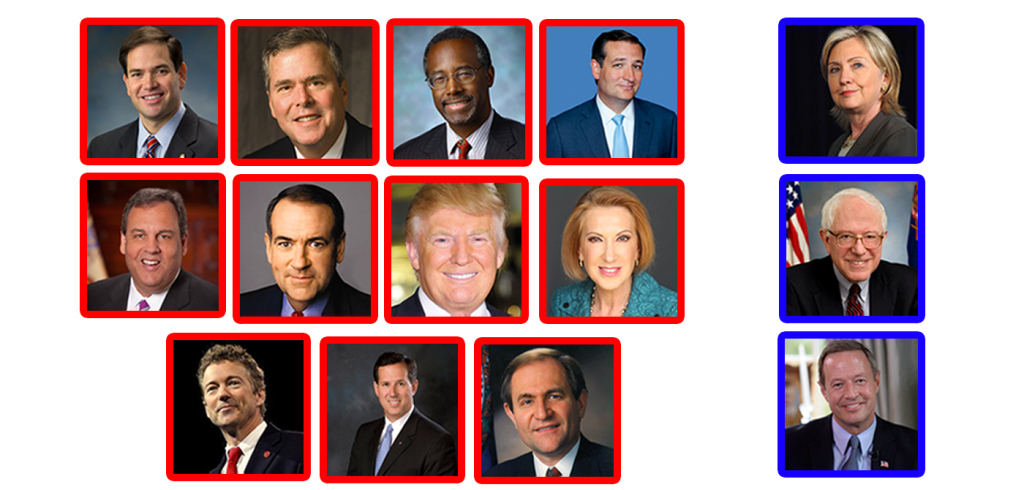
49 days until AL Presidential Primary 301 days until Election Day Convention Dates: Republican July 18-21, 2016, Democratic July 25-28, 2016 Weekly Headlines: Joe Biden says he regrets not running again for president Former New Mexico Gov. Gary Johnson announces entry into presidential race Former AIG chairman Hank Greenberg invests $10M in Jeb Bush Press Clips: Trump could win it all (US News and World Report 1/8/16) So if Donald Trump proved the political universe wrong and won the Republican presidential nomination, he would be creamed by Hillary Clinton, correct? A new survey of likely voters might at least raise momentary dyspepsia for Democrats since it suggests why it wouldn’t be a cakewalk. The survey by Washington-based Mercury Analytics is a combination online questionnaire and “dial-test” of Trump’s first big campaign ad among 916 self-proclaimed “likely voters” (this video shows the ad and the dial test results). It took place primarily Wednesday and Thursday and has a margin of error of plus or minus 3.5 percent. Rubio ‘can’t wait’ to face Hillary Clinton in 2016 presidential election (Aiken Standard 1/9/16) Florida Sen. Marco Rubio told Aiken residents on Saturday that he prays every night he’ll be the Republican nominee for president because he “can’t wait” to face off against Democratic candidate and former Secretary of State Hillary Clinton. Like many other candidates, Rubio implied it is a foregone conclusion that Clinton will win the Democratic nomination. “Beating Hillary” will take a candidate who understands what it’s like to live paycheck-to- paycheck, and who has had to deal with student loan debt, Rubio said Saturday at the Aiken Fairgrounds. Obama will not endorse a candidate in 2016 Democratic presidential race: White House (Reuters 1/10/16) U.S. President Barack Obama will not publicly endorse a candidate before the 2016 Democratic primary election, White House Chief of Staff Denis McDonough said on Sunday. “We’ll do exactly what has been done in the past,” McDonough said on NBC’s “Meet the Press.” He said Obama will be “out there” campaigning after the primary election to help support the Democratic candidate. Ben Carson woos churchgoers in Des Moines, Pleasant Hill (Des Moines Register 1/10/16) Republican presidential candidate and former neurosurgeon Ben Carson attended church services this morning at Corinthian Baptist Church to meet with parishioners and discuss the religious climate in the country. Carson, a member of the Seventh-day Adventist Church, spoke to the congregation about how his own faith influenced his career as a doctor. “Success is taking talent God has given you to elevate other people,” Carson said. Addressing Rev. Jonathan Whitfield’s questioning of Carson’s venture into politics, he said, “Lord opened those doors and pushed me that way.” Don’t Overlook Third Place In Iowa. Jeb Bush And Marco Rubio Sure Aren’t (NPR 1/7/16) Ted Cruz and Donald Trump are battling it out for first place in the Iowa GOP caucuses next month. But beneath the battle for first place, two other sharp-elbowed candidates are fighting hard here: Jeb Bush and Marco Rubio. The two Florida Republicans have almost no shot at winning Iowa, but their respective superPACs and campaigns are duking it out on the airwaves. Bernie Sanders Says He’s Democrats’ Most Electable Presidential Candidate (NBC News 1/10/16) Democratic presidential candidate Bernie Sanders said polls show he’s Democrats’ most electable 2016 candidate and that he’s “gaining steam” ahead of the fast-approaching Iowa caucuses. “If people are concerned about electability — and Democrats should be very concerned because we certainly don’t want to see some right-wing extremist in the White House — Bernie Sanders is the candidate,” Sanders told ABC’s George Stephanopoulos on “This Week” Sunday. Sanders cited a Quinnipiac Poll released last month showing he fares better than his main Democratic opponent Hillary Clinton against Republican front-runner Donald Trump. The poll shows Sanders beating Trump by 13 points, compared to Clinton’s smaller margin of 7 points. Bush super PAC goes after Christie in Iowa (Politico 1/10/16) The super PAC supporting former Florida Gov. Jeb Bush is going after New Jersey Gov. Chris Christie. The pro-Bush Right to Rise super PAC is sending out mailers questioning Christie’s record as governor in its first direct attack at Christie in Iowa. “Get the facts on Christie’s record as governor,” the mailer reads, continuing that under the New Jersey governor “New Jersey’s credit rating has been downgraded a record nine times” and that Christie “embraced a massive expansion of Obamacare.” The mailer, sent out to voters in Iowa, is yet another signal that the larger Bush political apparatus wants to prevent the New Jersey governor from leapfrogging Bush in either Iowa or New Hampshire, where Christie has enjoyed a polling bump.
Joe Biden on 2016 decision: ‘I regret it every day’
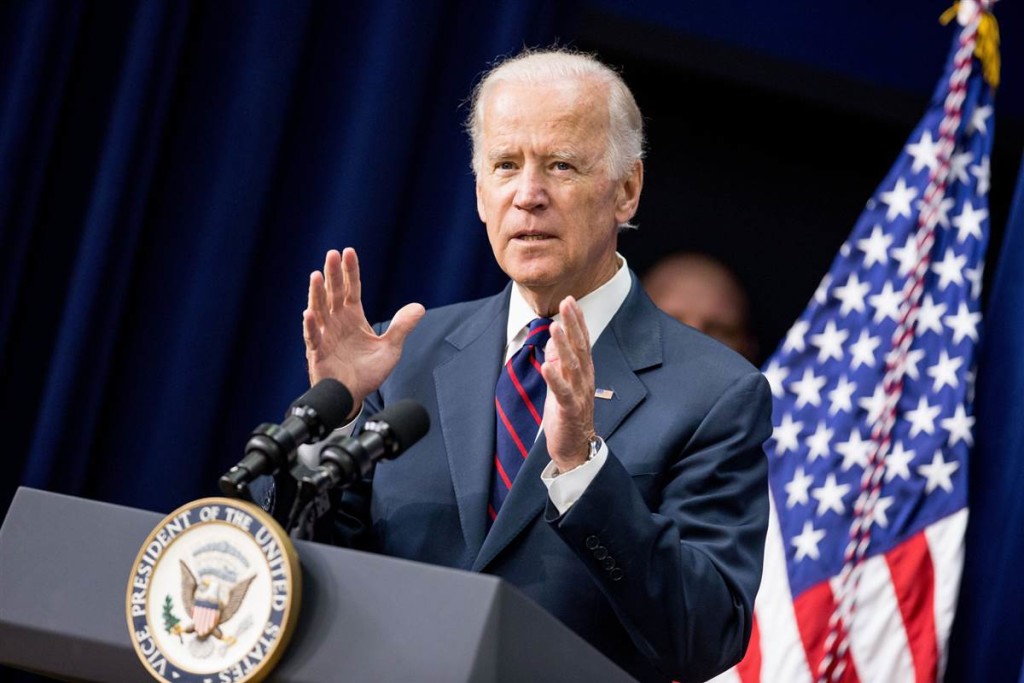
You can take Joe Biden out of the presidential campaign, but you can’t take the campaign out of Joe Biden. Three months after bowing out of the 2016 competition, the vice president has a few second thoughts about his decision. “I regret it every day,” Biden said Wednesday. Still, he said he made the right call for his family and for himself. And he pledged to stay “deeply involved” in the race to replace President Barack Obama. “We’ve got two good candidates,” Biden said, praising Hillary Clinton and Bernie Sanders for engaging in a “robust debate” devoid of personal attacks. He glossed over the third candidate running for the Democratic nomination, Martin O’Malley, whose campaign has struggled to gain traction. The vice president’s musings about the campaign he almost waged came in an interview with WVIT, one of five interviews Biden conducted to promote Obama’s executive actions on gun control. He told the Connecticut television station he was haunted by the thought of the 20 first-graders gunned down in Newtown — “those beautiful little babies in classrooms like dolls, discarded.” Turning to the Republican presidential primary, Biden said it had not been very illuminating so far. He singled out Donald Trump and Ted Cruz for comments they’ve made on the campaign trail. “I promise you, I’ve spoken to three of the presidential potential nominees on the Republican side who tell me, ‘Joe, it’s crazy,’” Biden said. “It’s absolutely crazy.” Biden spent months last year immersed in intensive deliberations with his political advisers and his family about whether to run for president a third time. Weighing heavily on his decision was his 46-year-old son Beau Biden’s death from brain cancer in May. In October, Biden announced that time had run out and that he wouldn’t run. Republished with permission of the Associated Press.
Police say Donald Trump issues 20K tickets for 1,400-seat Vermont venue
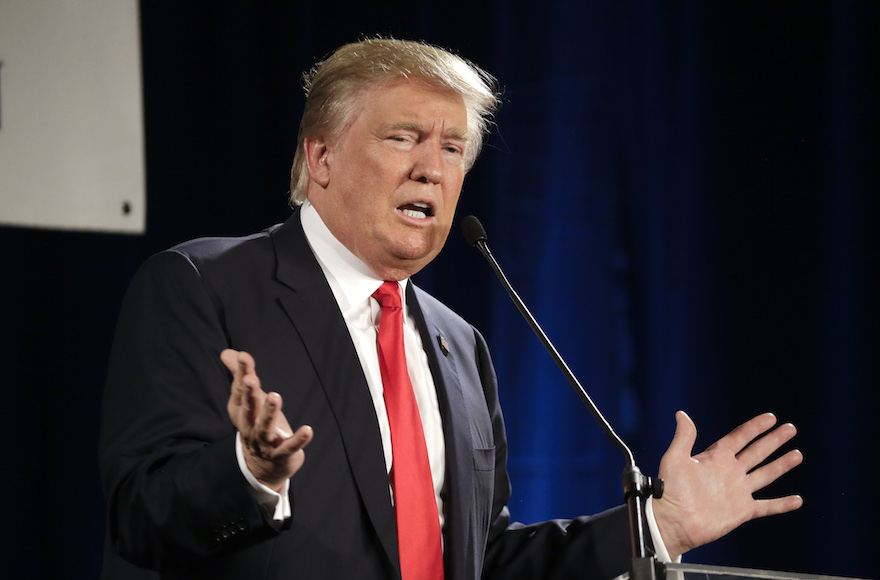
Republican presidential candidate Donald Trump‘s campaign has issued 20,000 tickets for an event at a Burlington, Vermont, venue that has only 1,400 seats, city police said Wednesday. Police Chief Brandon del Pozo acknowledged that those numbers, plus expected protesters, could be a public safety issue. If a rock group sold that many tickets to the downtown Flynn Theater, del Pozo told the Burlington Free Press, the city would cancel the event. He said that for now, Trump would be allowed to speak as scheduled because that would give people the chance to listen to a major presidential candidate. Burlington is a liberal bastion inside a solidly Democratic state and the hometown of Democratic presidential candidate Bernie Sanders — a self-described democratic socialist. In fact, the Flynn Theater is across the street from City Hall — where Sanders served as mayor. A Trump campaign spokeswoman did not immediately respond to the report. Police say that anyone arriving for the Trump event once the Flynn has been filled will be turned away. In a statement issued after Trump’s visit to Vermont became known, Sanders said he welcomed him to Vermont. The Vermont Republican Party has said it had no role in Trump’s visit to the state, but they welcome his thoughts. The Vermont Democratic Party is asking its members to make charitable contributions to organizations that represent some of their core Democratic values. Republished with permission of the Associated Press.
Bernie Sanders vowing to break up banks during first year in office
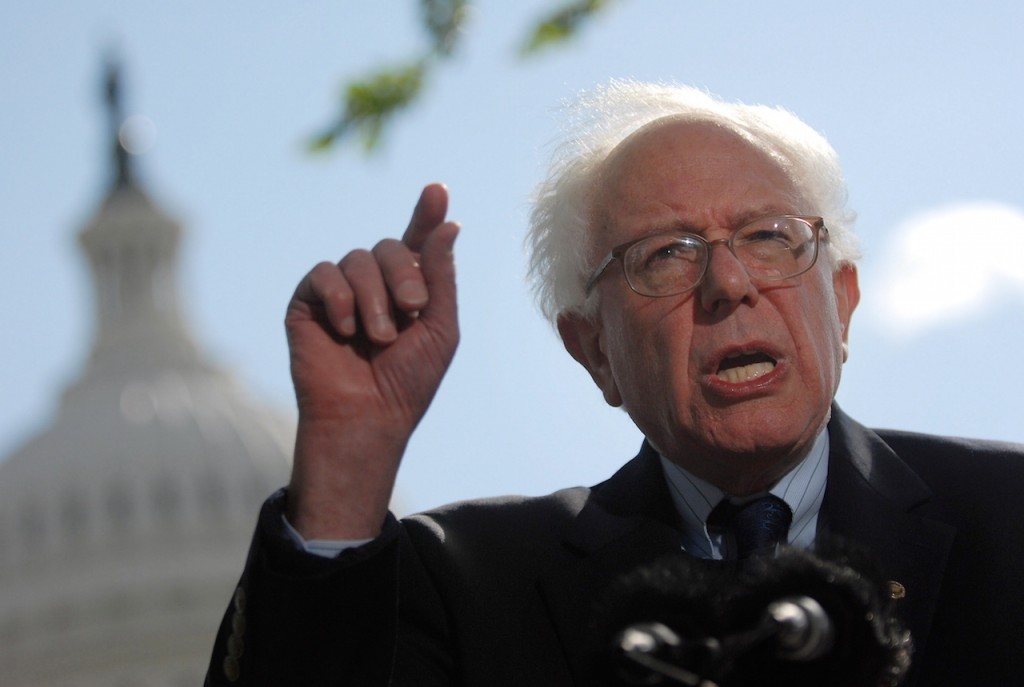
Characterizing Wall Street as an industry run on “greed, fraud, dishonesty and arrogance,” Democratic presidential candidate Bernie Sanders pledged to break up the country’s biggest financial firms within a year and limit banking fees placed on consumers, should he become president, in a fiery speech on Tuesday. He coupled that promise, delivered in front of a raucous crowd just a few subway stops from Wall Street, with a series of attacks on rival Hillary Clinton, arguing her personal and political ties make her unable to truly take on the financial industry. “To those on Wall Street who may be listening today, let me be very clear: Greed is not good,” said Sanders, in a reference to Oliver Stone‘s 1980s film, “Wall Street.” “If Wall Street does not end its greed, we will end it for them,” he said, as a cheering audience jumped to its feet. Sanders has made regulating Wall Street a focus of his primary bid, with calls to curb the political influence of “millionaires and billionaires” at the core of his message. But the attacks on Clinton marked an escalation in his offensive against the Democratic front-runner. Clinton’s policies, he said, would do little more than “impose a few more fees and regulations.” “My opponent says that, as a senator, she told bankers to ‘cut it out’ and end their destructive behavior,” he said, to laughter. “But, in my view, establishment politicians are the ones who need to cut it out,” he said. Clinton responded at a campaign event in Sioux City, Iowa, on Tuesday evening, saying her policies would take on a wide range of financial actors, including insurance companies and investment houses that helped spark the 2008 recession. “I have a broader, more comprehensive set of policies about everything including taking on Wall Street,” she said. “I want to go after everybody who poses a risk to our financial system.” Clinton and her husband, former President Bill Clinton, have made tens of millions in speaking fees from addresses to Wall Street banks, insurance companies and other financial firms – a fact Sanders alluded to in his speech, saying the banks give “very generous speaking fees to those who go before them.” She also opposes reinstating the Depression-era Glass-Steagall Act, which effectively limited the size of financial companies by prohibiting commercial banks from engaging in investment banking activities. Sanders would re-establish the law, initially repealed during the Clinton administration. Many economists question whether that law would have prevented the crisis, given that many financial institutions that failed, including Lehman Brothers and Bear Stearns, were investment banks and their failure wouldn’t have been prevented by Glass-Steagall. Sanders vowed to create a “too-big-to-fail” list of companies within the first 100 days of his administration whose failure would pose a grave risk to the U.S. economy without a taxpayer bailout. Those firms would be forced to reorganize within a year. Sanders also said he wants to cap ATM fees at two dollars and cap interest rates on credit cards and consumer loans at 15 percent. He also promised to take a tougher tact against industry abuses, noting that major financial institutions have been fined only $204 billion since 2009. And he promised to restructure credit rating agencies and the Federal Reserve, so bankers cannot serve on the body’s board. “The reality is that fraud is the business model on Wall Street,” he said. “It is not the exception to the rule. It is the rule.” Analysts say Sanders’ plans to break up the large banks would be difficult to achieve and is not the only way to limit their size or future bailouts. “While it makes for great political theater, there is zero chance of breaking up the large banks,” Greg McBride, chief financial analyst at Bankrate.com, said. His plans would require agreements from the heads of many agencies and other regulators, which Sanders would appoint. But those appointments also would require approval by the Senate. Nominees that support breaking up the banks would be unlikely to make it through Senate confirmation, according to Mike Konczal, Fellow at the Roosevelt Institute. Several pieces of legislation to break up large banks have been introduced in Congress since the crisis but none have won much support by either Democratic or GOP majorities. Republished with permission of the Associated Press.
Hillary Clinton trying to light fire among Iowa activists
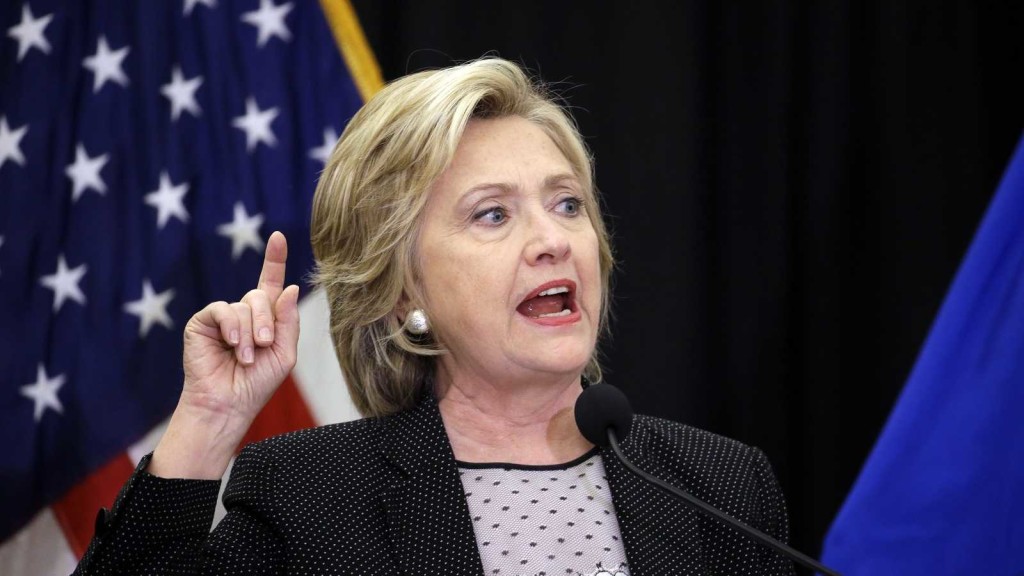
National polls notwithstanding, Hillary Clinton is guarding against complacency as she travels along the snow-covered fields of Iowa. “I need you,” she says repeatedly on the rope-line between handshakes and selfies. Wary of another mishap in Iowa, Clinton is preaching a message of urgency, challenging her supporters to dig in during the final month before the state’s lead-off presidential caucus. She casts her candidacy as a check against Republicans and avoids mentioning her main Democratic rival, Bernie Sanders, whose polling numbers remain at striking distance. “We can’t take anything for granted,” Clinton said at Des Moines’ State Historical Museum Monday night, a replica of a massive wooly mammoth looming off to the side as she spoke. “It doesn’t happen just because we wish it. It doesn’t happen because it’s inevitable.” Clinton’s presidential bid faltered in Iowa in 2008, when she finished third against then-Sens. Barack Obama and John Edwards. She defeated Obama in the New Hampshire primary but the future president prevailed after outlasting Clinton in a series of contests during the spring. This time, Clinton has built a formidable team of field organizers around Iowa, mindful of the ground game edge that Obama had in the state in 2007 and 2008. Polls have shown Sanders leading in New Hampshire, his neighbor to the east, giving Clinton little margin for error here. If the former secretary of state stumbles in Iowa again and is defeated by Sanders in New Hampshire, it would almost certainly renew worries about her ability to unify the party’s liberal and moderate factions. She enjoys strong support among Latino and black voters who are pivotal in Nevada and South Carolina, the third and fourth contests, but consecutive losses might diminish her standing. “If I get off to a good start here in Iowa, we’re halfway home,” Clinton said in Davenport. During a stop Tuesday night in Council Bluffs, she urged Democrats to consider a candidate’s “electability and how we make sure we have a Democrat going back in the White House in January 2017.” Few and far between are the days between now and the Feb. 1 caucuses in which Clinton or one of her messengers aren’t scheduled to campaign around Iowa. Former President Bill Clinton will be in Cedar Rapids and Dubuque on Thursday on behalf of his wife, and is certain to return. Her team is also dispatching backers like Virginia Gov. Terry McAuliffe, a top adviser during her 2008 campaign, and actress Lena Dunham of HBO’s “Girls” in the coming days. “Nobody’s complacent because of the 2007 and 2008 experience. This is not a done deal,” said Agriculture Secretary Tom Vilsack, a former Iowa governor introducing Clinton at events on Monday. “I like what she’s doing — she’s reminding people what’s at stake here. That’s a motivating factor.” Much of Clinton’s message revolves around defending Obama’s legacy. She warns that a Republican president would repeal Obama’s health care law, slash taxes on the wealthy, and undercut executive actions on gun violence and pollution. Part of her goal is to make a personal connection with voters over issues, as she puts it, “that keep families up at night.” In Sioux City on Tuesday, she rolled out a new initiative to provide more federal resources for 3.5 million Americans with autism. Last month, she announced a $2 billion plan to address Alzheimer’s during a stop in Fairfield, Iowa, and she frequently talks about substance abuse and mental health problems at events. Democrats say Sanders appears to have made a more emotional connection with his supporters — even though polls show him trailing here — while Clinton is viewed as the party’s standard-bearer and favorite to win the nomination. “He seems more genuine,” said Dan McCarthy of Bettendorf, a defense worker who spoke about Sanders as he sat with his mother before a Clinton event in Davenport. “I don’t like the idea of having the same people over and over again. You’re not going to change anything.” McCarthy said he was supporting the Vermont senator while his mother, Joan, said she was still assessing the Democratic field. But Clinton’s argument brought at least one fence-sitter onto her side in Des Moines. “To me, it’s who is more electable,” said Al Hart, a retired social studies teacher from Ankeny who said he decided to support Clinton after listening to her speech at the museum. “I think she’s got the fire in belly to get elected. She’s been through this before.” Grant Woodard, a Des Moines lawyer and veteran of several Democratic campaigns, said the size of the caucus would play a major role given Sanders’ attempt to attract college students and first-time caucus-goers. Most expect it to fall somewhere between 2008’s record of about 240,000 and the 125,000 who participated in 2004. “Sanders people are more motivated but I am not sure there’s enough of them,” Woodard said. As for Clinton, he said the challenge was simple: “How do you keep them motivated when folks think this is in the bag?” Republished with permission of the Associated Press.
Presidential Primary Brief: 308 days until Election Day

105 days until AL Presidential Primary 308 days until Election Day Convention Dates: Republican July 18-21, 2016, Democratic July 25-28, 2016 Weekly Headlines: Pro-Cruz super PAC to air $4M in TV ads in Iowa, South Carolina Sanders raises $33M in final quarter, $73M total for 2015 Rand Paul-backing super PAC reserves $500,000 in Iowa ads Press Clips: What 2016 holds in store for guns, the NRA, and the presidential election (Media Matters 1/2/16) Following another series of horrific mass shootings in 2015 that captured the public’s attention, gun safety has emerged as a major campaign issue for the 2016 elections. It’s already clear how the National Rifle Association (NRA) will use the issue to try to swing the elections and hamstring any attempts at new legislation – after all, they’ve been using the same playbook for years. As U.S. gun deaths continue to tick upwards — now on par with automobile deaths — public interest in gun issues in 2015 rose to its highest level since the 2012 Sandy Hook Elementary School massacre. This year, Americans watched news reports of public shootings targeting parishioners in Charleston, South Carolina, service members in Chattanooga, Tennessee, moviegoers in Lafayette, Louisiana, students and educators in Roseburg, Oregon, people visiting a Planned Parenthood health clinic in Colorado Springs, Colorado, and attendees of a Christmas party in San Bernardino, California. Sold out crowd at Donald Trump’s Biloxi rally (WKRG News 1/3/16) Donald Trump’s second trip to the Gulf Coast attracted more than 14,000 people to the Biloxi Coliseum. Hours before the doors opened, the line wrapped around the building. One man said he traveled from Tennessee and showed up at 7:30 a.m. to earn a spot near the podium. “Did I mention this is my 15th Trump rally since August? You have to show up early,” the fan said. Ralph Cihall attracted a small crowd himself when he pulled up in a lime green stretch Hummer limousine adorned with Trump posters on the windows. How the Bush camp plans to save his candidacy (Boston Globe 1/2/16) Jeb Bush and his supporters still have a pile of money to spend — remnants of $100 million raised when he seemed early last year to be a sure bet. They have an expansive ground operation in New Hampshire. And allies have just begun a new ad campaign in Iowa. But nothing they have tried so far has lifted Bush’s terrible poll numbers. And with just four weeks remaining until voting begins, Bush needs to do something to save his candidacy. Ben Carson explains staff shakeup (CNN 1/3/16) Ben Carson explained last week’s major staff shakeup Sunday by saying he’s now “in a different ballgame” and the campaign leadership he had in place was unable to execute its own plans. The retired pediatric brain surgeon and Republican presidential candidate discussed the departure of his chief of staff, communications director and policy director on ABC’s “This Week.” “We have had very good people that had very good ideas and no one predicted that we would even be in the hunt,” Carson told host Martha Raddatz. “It really is quite spectacular what we were able to do. But the fact of the matter is now we’re in a different ballgame and we need the ability to execute and not just have good ideas.” As Hillary Clinton prepares to unveil new tax plans, previous proposals have occupied a political middle ground (IB Times 1/3/16) Less than a month before Iowa voters head to the polls and officially kick off the long- awaited presidential primary season, Democratic front-runner Hillary Clinton is preparing to unveil tax proposals designed to raise rates on the wealthiest Americans. “As president, I’ll do what it takes to make sure the super-wealthy are truly paying their fair share,” the former secretary of state said in a statement Saturday. “In the coming weeks,” she added, “I will be laying out additional proposals that go beyond the Buffett rule.” Poll shows attacks on Bill Clinton may only help Hillary Clinton (12/31/15) Donald J. Trump made clear this week that nothing was off limits when it came to attacking the Clintons, dusting off names like Monica Lewinsky and Paula Jones while calling former President Bill Clinton one of “the great abusers of the world.” Sexual indiscretions of the past, he said, are fair game in an election year. But the numbers show that Mr. Trump, the billionaire developer and Republican presidential hopeful, might not be dealing with a hand as strong as he thinks when he reminds voters of Mr. Clinton’s history of infidelity. Hillary Clinton’s popularity has had its peaks and valleys during her decades in the public spotlight, most recently rising to new heights when she was serving as secretary of state. Her other peak, according to polls, was in 1998 while her husband was embroiled in the Lewinsky scandal and facing impeachment. Marco Rubio plans to reverse Obama’s planned gun limits (TIME 1/3/16) Presidential hopeful Marco Rubio is promising that he would reverse President Obama’s executive action on gun rights on his first day in the White House, his latest play at New Hampshire’s deeply pro-gun Republicans. Speaking Sunday evening in the Granite State, Rubio cast the man he hopes to replace in the White House as someone trampling the Constitution. Rubio’s remarks came hours before Obama was set on Monday to announce new moves to strengthen background checks that would-be gun buyers face. Rand Paul: Hillary will “take us back to war” (The Hill 1/3/16) Sen. Rand Paul (R-Ky.) has a warning for war-weary Americans who often criticize the Bush administration for intervening in the Middle East. “It turns out that probably the most likely candidate to take us back to war is Hillary Clinton,” the Republican presidential candidate told NBC’s “Meet the Press.” Clinton’s support for regime change in certain situations could pull the U.S. back into war, Paul argued Sunday morning. “The difference is President Obama and Hillary Clinton both supported arming the Syrian rebels, the Islamic
7 things to watch in monthlong sprint to Iowa’s caucuses

The 2016 presidential election has defied all expectations so far. An enormous field of GOP candidates, still a dozen strong with a month to go before the leadoff Iowa caucuses on Feb. 1. The billionaire outsider who has tapped into the anger and fears of a nervous nation. A son and brother of presidents who is struggling to connect with voters despite his tremendous financial advantage. In less than a month, voters will begin having their say in what could turn out to be a bitter, monthslong fight for the Republican nomination. On the Democratic side, front-runner Hillary Clinton is banking on neatly locking up the nomination as her GOP rivals tear each other down. Some things to watch for in the four-week sprint to the Iowa caucuses: DONALD TRUMP’S CHECKBOOK To date, wealthy businessman Donald Trump has run a frugal campaign, skipping expensive television advertising as his Republican rivals and their affiliated super political action committees spend tens of millions of dollars on airtime. Trump has promised that that’s about to change, announcing plans last week to spend $2 million a week on the air in three early voting states. Will Trump follow through on that promise? Television ad prices are only increasing as the voting draws closer, and Trump has yet to reserve any airtime. TED CRUZ’S CLERGY Texas Sen. Ted Cruz is building a large organization of support in Iowa, amassing county leaders across the state and tapping a member of the clergy in each of the 99 counties. The son of a preacher, Cruz aims to take a well-worn path to victory in Iowa: Former Arkansas Gov. Mike Huckabee in 2008 and former Pennsylvania Sen. Rick Santorum in 2012 generated similar support among the state’s evangelical voters, and each won the caucuses. The question is whether that network of religious conservatives will coalesce behind Cruz this time or splinter. Cruz has made strides, picking up the endorsements of Iowa evangelical leader Bob Vander Plaats and Focus on the Family founder James Dobson. ESTABLISHMENT CHOICES Former Florida Gov. Jeb Bush, who entered the race in June as the front-runner, jokes that his father, former President George H.W. Bush, has taken to throwing shoes at his television set in response to Trump. But as the caucuses near, the laugh lines have given to persistent frustration among party elders and its professional class that Trump remains a viable candidate. Several have said an effort must be mounted to take down Trump, but a coordinated campaign of negative ads has so far failed to materialize. That’s because in part to concerns that it could backfire and further motivate Trump’s supporters, but also because several candidates vying to be the establishment choice are still in the race. Will there be an attempt to undermine Trump? Will Bush — or Florida Sen. Marco Rubio, Ohio Gov. John Kasich or New Jersey Gov. Chris Christie — emerge as the clear alternative to Trump before Trump or Cruz collects too many delegates to matter? DEPARTURE LOUNGE Two low-polling Republicans quit in December: South Carolina Sen. Lindsey Graham and former New York Gov. George Pataki. While all the remaining candidates insist they’re not going anywhere, pressure could grow on other candidates to bow out and narrow the field. Among those feeling the heat: Santorum, who has failed to produce the kind of excitement that propelled him to that Iowa victory four years ago. If he and others at the bottom dropped out and endorsed the same candidate, it could give rise to the Trump alternative who some are desperately seeking. CLINTON’S TEST A third-place finish in 2008 in Iowa completely disrupted Clinton’s strategy to win the Democratic nomination, and she never could catch then-Illinois Sen. Barack Obama. This time, Clinton has poured significant resources and staff into the state. Polls show her with an edge over her chief rival, Sen. Bernie Sanders, a Vermont independent. If Clinton wins Iowa, a loss in New Hampshire to Sanders would be easier to contain. Back-to-back losses in Iowa and New Hampshire would generate fresh worries among Democrats about their front-runner. JANUARY SURPRISES The attacks in Paris and San Bernardino, California, shifted voters’ focus to national security issues. That was to the detriment of less-experienced and less-hawkish candidates, including retired neurosurgeon Ben Carson on the GOP side and Sanders. Another attack, especially on American soil, could further diminish candidates without experience in office or those uncomfortable with a campaign focus on foreign policy. FINAL DEBATES The Republicans have two more debates — Jan. 14 in South Carolina and Jan. 28 in Iowa — before the Feb. 1 caucuses. Democrats will debate Jan. 17, also in South Carolina. The GOP debates in 2015 broke viewership records, and the next two probably may provide make-or-break moments as undecided voters begin making up their minds. Republished with permission of the Associated Press.
Hillary Clinton campaign reports $37M in primary money in Q4
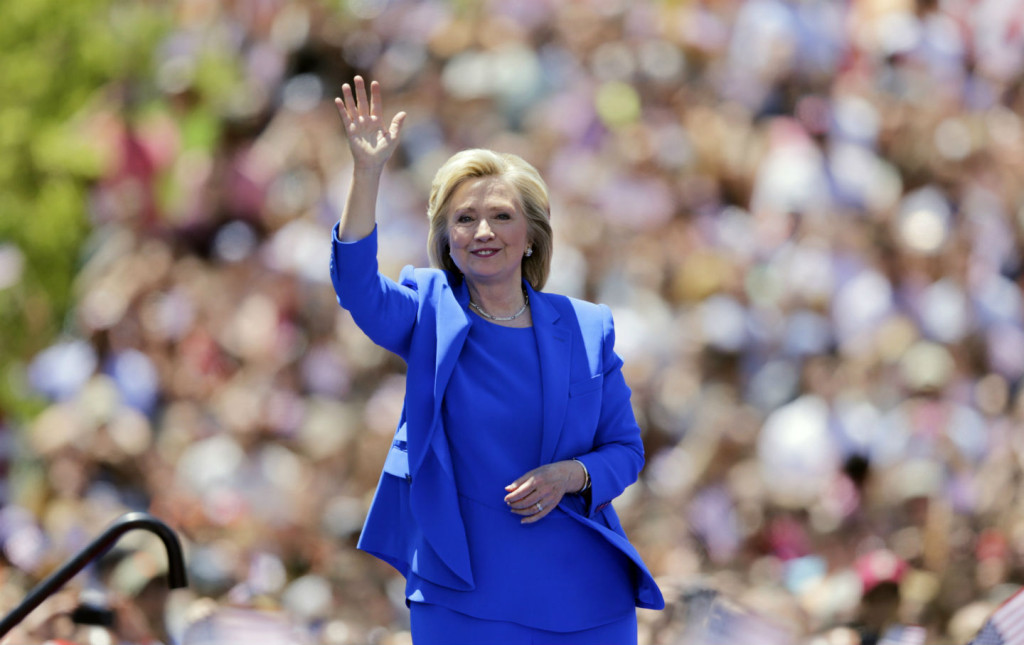
Hillary Clinton‘s presidential campaign said Friday it raised $37 million in the past three months and more than $112 million in all of 2015 to support her bid for the Democratic nomination. Clinton’s team also said she raised $18 million for the Democratic National Committee and state Democratic parties nationwide in the fourth quarter, putting her total haul for the past three months at $55 million. The fundraising for the DNC and state parties is aimed at helping Clinton in the general election should she win her party’s nomination. Clinton’s fourth-quarter amount exceeded the $28 million she raised in the three months that ended Sept. 30. Heading into the January sprint toward the leadoff Iowa caucuses on Feb. 1, Clinton’s campaign said it has nearly $38 million in cash on hand. “Thanks to the hundreds of thousands of Americans who have joined together and powered this historic campaign, we are now heading into Iowa and New Hampshire with the resources we need to be successful,” campaign manager Robby Mook said in a statement. Clinton’s campaign had set a goal of $100 million for the primary in 2015. Clinton’s chief rival, Bernie Sanders, did not immediately report his fundraising totals for the quarter that ended on Dec. 31. But the Vermont senator has collected more than 2 million individual contributions and raised money online at a vigorous pace, taking in about $40 million through the end of September and ending that period with about $27 million in the bank. His campaign has noted that most of its donors have given in small increments — about $20 to $30 apiece — allowing Sanders to return to them repeatedly. While Clinton has built a steady lead in national polls, Sanders remains competitive against her in Iowa and holds a slight advantage in New Hampshire, his New England neighbor which holds its primary on Feb. 9. The third major Democrat in the race, former Maryland Gov. Martin O’Malley, has lagged behind Clinton and Sanders in fundraising and polls. The Clinton campaign said more than 60 percent of its donors in 2015 were women. It also said 94 percent of the donations it received in the fourth quarter came in increments of $100 or less, but it did not say what percentage of its overall fundraising total came from such small-dollar donors. The campaign spent about $75 million in 2015, building large organizations in the early voting states and a data-driven operation to connect with voters. Helped by several fundraisers headlined by former President Bill Clinton, most of Hillary Clinton’s money came via traditional fundraising events, where the price of entry was often the legal maximum donation of $2,700 for the primary. The presidential candidates have until Jan. 31 to report such details to federal regulators. Clinton isn’t alone in releasing some selective details ahead of that schedule. Earlier this week, Republican Texas Sen. Ted Cruz‘s campaign said it had raised nearly $20 million in the fourth quarter. Cruz’s campaign said in a memo to supporters that he will finish the year having raised more than $45 million, but it did not disclose how much the campaign has spent or how much cash it has on hand.
Martin O’Malley fails to qualify for Ohio’s presidential primary ballot
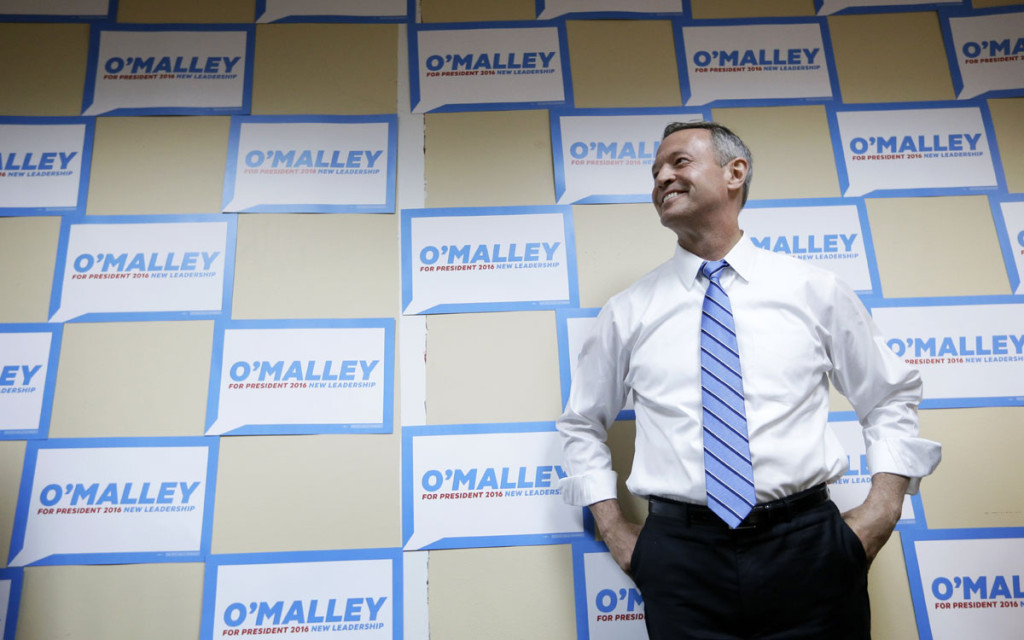
Democratic presidential candidate Martin O’Malley has failed to qualify for Ohio’s primary ballot, falling short of the signatures needed to appear before the state’s voters. A spokesman for Ohio Secretary of State Jon Husted (HYOO’-sted) tells The Associated Press that O’Malley failed to get the 1,000 valid signatures needed to appear on March 15 primary ballots. The former Maryland governor’s campaign submitted 1,175 signatures, but only 772 were found to be valid. O’Malley spokeswoman Haley Morris says the campaign is exploring its options. She says O’Malley will campaign vigorously in Ohio. O’Malley is running an underdog bid for his party’s nomination against Hillary Clinton and Bernie Sanders. Clinton already has the support of some key Democratic insiders in Ohio, where she won the 2008 primary over Barack Obama. Republished with permission of the Associated Press.
Presidential Primary Brief: 315 days until Election Day
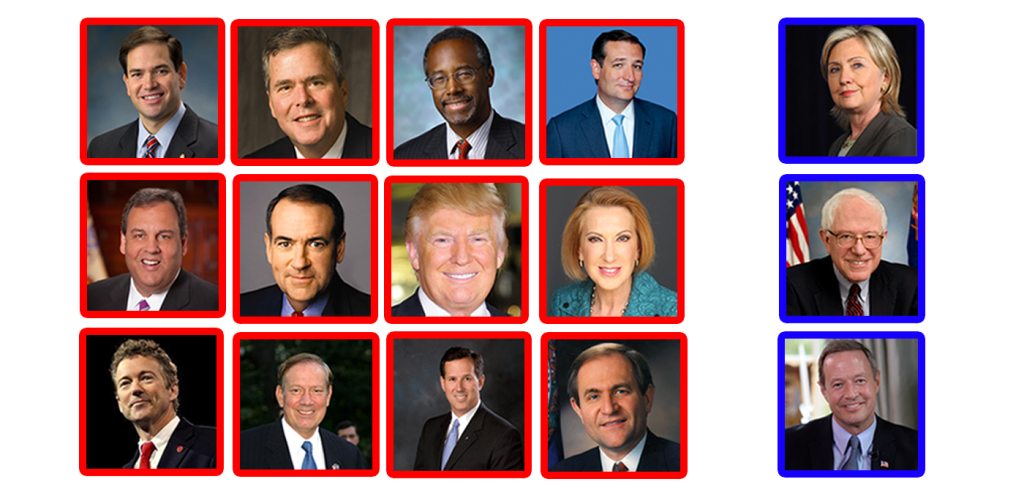
112 days until AL Presidential Primary 315 days until Election Day Convention Dates: Republican July 18-21, 2016, Democratic July 25-28, 2016 Weekly Headlines: Lindsey Graham drops out of presidential race Poll: Clinton strengthens national lead over Sanders Huckabee says he’ll drop out if he doesn’t place in top 3 in Iowa Press Clips: Bernie Sanders in ‘negotiations’ with DNC over data breach (Politico 12/27/16) Presidential candidate Bernie Sanders said Sunday he’s in “negotiations” with the Democratic National Committee following an ugly spat that led to the firing of a Sanders campaign staffer accused of accessing voter data belonging to the Hillary Clinton campaign. “We’re trying to work with the DNC to put this whole thing behind us,” Sanders said on NBC’s “Meet the Press.” “Frankly,” the Vermont senator added, “I think for the American people there are far more important issues having to do with the disappearance of the American middle class and huge income and wealth inequality and climate change.” Ben Carson tries to explain his campaign’s decline (CBS News 12/27/15) Ben Carson said on CBS’ “Face the Nation” Sunday that he is prepared to makes changes or tweaks to his struggling presidential campaign, including being more aggressive about responding to negative stories. “I want to make sure that we’re doing everything that we can do — to make sure that the American people absolutely recognize the choice that they have,” Carson said on “Face the Nation.” “If there are some things that need to be changed or tweaked, we certainly are going to be open to doing those things. Last week he said in an interview with the Associated Press that he plans to shake up his strategy or staff now that his poll numbers have slipped so badly. Jeb Bush shows signs of life in New Hampshire (Politico 12/22/15) No candidate can be happier to say goodbye to 2015 than Jeb Bush, whose months of futility in the face of Donald Trump’s attacks relegated him to an afterthought in a wild and unpredictable Republican primary. And yet, at year’s end, there are signs that people in New Hampshire, the state that could key an unlikely comeback, still take him seriously. Take the 200-person crowds showing up at his four Saturday town halls. Take the current polls in New Hampshire that put him within striking distance of every GOP rival but Trump. Clinton announces plan to battle Alzheimer’s (Reuters 12/22/15) Democratic presidential candidate Hillary Clinton on Tuesday announced a slate of proposals to battle Alzheimer’s disease and seek a cure by 2025, including an increase in funding for research on the disease and related disorders. Clinton called for a decade-long investment of $2 billion per year for research, which her campaign called a fourfold increase over last year’s $586 million. Clinton’s campaign scheduled a conference call with reporters on Tuesday to discuss details of the proposal. Clinton, the front-runner for her party’s nomination for the November 2016 presidential election, will discuss it later in the day in an appearance in Fair field, Iowa. Trump’s attacks on Clinton get very, very personal (Politico 12/21/15) Donald Trump is taking his criticism of Hillary Clinton into new territory. The Republican front-runner mocked his Democratic counterpart for a “disgusting” bathroom trip she made during Saturday night’s debate, and said Barack Obama “schlonged” her in the 2008 primaries at a raucous rally here on Monday night. How Marco Rubio could lose all the key early states and still win (New York Times 12/22/15) People who make bets on the presidential election give Marco Rubio a slight edge for the Republican nomination. But there’s a catch: The same betting markets show that he’s an underdog in all of the early states, and not favored in any of the Super Tuesday states. It’s not clear even the Rubio team disagrees. My colleague Jeremy W. Peters reported that the campaign doesn’t have a plan to focus on any early state. That has supporters concerned. And with good reason. Mr. Rubio would have a much surer path to the nomination if he led in an early state. His difficulty finding a place to break through is a result of what has always been his biggest problem: carving out a niche in a deeply factionalized party. 29 craziest things that came out of candidates’ mouths in 2015 (Politico 12/26/15) The presidential campaign in 2015 generated no shortage of head-scratching quotes, zingers, one-liners and out-of-left-field remarks from candidates in both parties. From Hillary Clinton’s self-professed ignorance about how servers work, to Ted Cruz’s vow to find out “if sand can glow in the dark,” to practically everything that has come out of Donald Trump’s mouth, voters have a lot to chew on as they consider their choices less than two months before the first primaries and caucuses. Jeb Bush burns through campaign cash, slides in polls (Washington Times 12/24/15) After starting 2015 as the presumptive front-runner with a huge bankroll, Jeb Bush has to be ending the year wondering what went wrong with his presidential campaign, what happened to his Republican Party and where all his money went. Mr. Bush and his super PAC burned through more than half of the $133 million they raised in the first three quarters this year. The return on that investment has been a drop in polls from about 15 percent when he entered the race in June to about 4 percent in recent surveys. Christie sharpens attacks on Rubio in New Hampshire (Politico 12/22/15) Chris Christie slammed Marco Rubio on Tuesday for missing last week’s vote on the omnibus spending bill, arguing that it highlights a distinct difference between the two candidates vying for the Republican nomination. Christie, who is betting big on New Hampshire, has been sharpening his attacks on Rubio — a ripe target for Christie considering that the Florida senator holds only a slight edge over Christie in the state. Trump beats Republicans, not Clinton, in one-on-one matchups (Reuters 12/21/15) Donald Trump would win a hypothetical head-to-head


